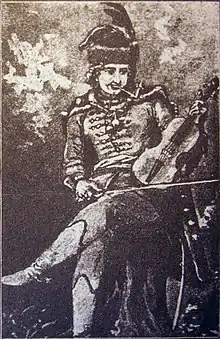Panna Czinka
Panna Czinka (Hungarian: Czinka Panna, Slovak: Panna Cinková) (1711(?) – 1772) was a famous Hungarian-Romani violinist.[1]

Life
Czinka was born in Sajógömör, Hungary (modern-day Gemer, Slovakia) to a Romani family of musicians. Her father was a court musician of Francis II Rákóczi. Her father and brothers are said to be the authors of the Rákóczi March, etc.
She studied music in Rozsnyó (today Rožňava) and married a Romani musician-blacksmith. Legends claim that she played violin at the age of 9. After 1725 Czinka formed a music band with her husband and brothers-in-law. She designed a uniform of sorts for the band. She became famous for her skill with a violin. She played first violin in this ensemble. The band toured abroad and was invited to perform in noble houses. She also gave birth to four sons and one daughter. Her father and brothers are said by some to be the authors of the Rákóczi March among others.
Panna Czinka died in 1772 and was buried on 5 February in Gemer. Her grave has not survived. Many Hungarian writers and composers — such as Mór Jókai, Zoltán Kodály, and Endre Dózsa — refer to her their works.
Legacy
She was portrayed by Anna Gurji in Dušan Rapoš's biographical film Czinka Panna.
References
- Anita Awosusi (Hrsg.): Die Musik der Sinti und Roma. Bd. 1: Die ungarische ›Zigeunermusik‹. Schriftenreihe des Dokumentations- und Kulturzentrums Deutscher Sinti und Roma. Schüssler, Heidelberg 1996, ISBN 978-3-929446-07-4.
External links
- Entry in Magyar Életrajzi Lexikon (in Hungarian)
- Biography in Rombase Archived 2012-02-25 at the Wayback Machine